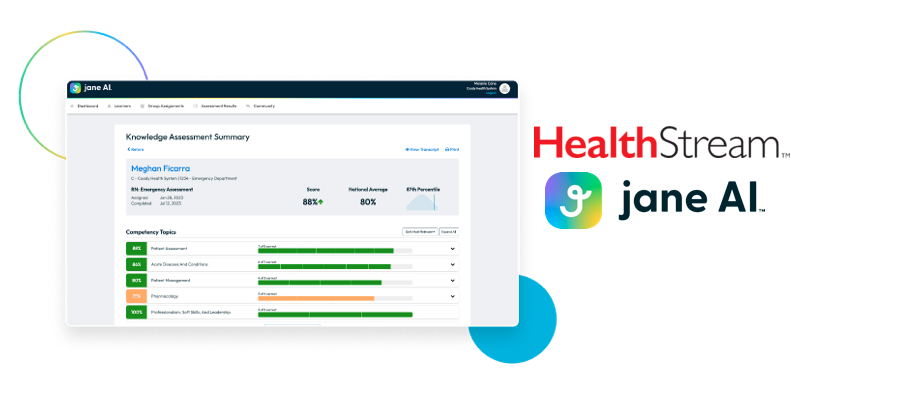HealthStream’s jane AI – Individualized Competency-Based Validation and Assessment Program
HealthStream’s jane AI is a new Artificial Intelligence tool to help measure clinical judgment, offer clinical development analytics, and personalize competency development for nurses and other clinical teams. jane AI will help healthcare organizations assess discover where their nurses excel and where there’s opportunity for improvement, focus learning to improve competence, and provide insights on clinical performance and potential risk areas. This HealthySimulation.com article by Jill Benns, RN, MSN-MBA-HCM, NPD-BC, will address competency based nursing and HealthStream’s jane AI for individualized competency-based validation and assessment program.
HealthStream is an information technology and services company that is dedicated to improving patient outcomes through the development of healthcare organizations’ greatest asset: their people. Healthcare simulation is a valuable effective method for evaluating clinical competency. Assessing, validating, and evaluating clinical competency is essential to safe patient care and nursing professional development. Traditionally, this process has been static, focused on entry to practice, and maintained a focus as a regulatory requirement. With the technological advances in the healthcare industry today, the nursing profession can finally advance the process into the dynamic, ongoing, and individualized professional development tool that nursing competency is meant to be.
Now more than ever in documented history, the healthcare landscape is changing; the complexity of patients admitted to the hospital is increasing, and the regulations associated with caring for those patients are growing. At the same time, less than 10% of nurses self-report the competencies they need during their transition to practice (Wells-Beede et al., 2023) The time for a change in nursing competency is now!
Sponsored Content:
Competency-Based Nursing and Artificial Intelligence (AI)
Nursing competency has been a hot topic lately, and nursing education and practice in the current system has room for improvement. While regulations are in place, they lack standardization, which makes measuring the return on investment for competency management and development difficult. The American Nurses Association recently published an article urging nursing educators to incorporate artificial intelligence-based clinical practice methodologies into their teaching to prepare nurses for the future (Grube, 2022). This is an exciting step forward!
Additionally, the National Council of State Boards of Nursing focuses on clinical competency and changed the Next Generation NCLEX examination in 2023 to emphasize clinical judgment, a competency at the foundational level for a nurse (Overbaugh & Laske, 2023). Articles published in multiple nursing journals, such as the Journal of Nursing Education, also renew their focus on clinical competency development, suggesting that low or high-fidelity simulation could help students apply the nursing process in critical situations and treat diverse clients with complex disease processes based on evidence-based practice principles (Overbaugh and Laske, 188). We must evolve and customize our approach to nursing competency, leveraging technology to improve outcomes.
Leveraging artificial intelligence (AI) and additional technological training aids can enhance the nursing profession’s ability to carry out competency-based evaluations effectively. AI has already been utilized in healthcare, though in basic forms, including acuity models, decision support tools, and medication safety features. These AI-based tools have been in use for some time. In healthcare, AI functions as a catalog that can detect patterns and trends faster than humans or before humans can do so. AI offers support in informatics and automation, which reduces the workload generated. Furthermore, AI facilitates making processes portable, standardized, and transformative.
Sponsored Content:
HealthStream’s jane AI software is a competency-based assessment system that evaluates, develops, and validates learners. HealthStream’s jane uses AI to customize questions, recommend content, and assess the learner’s level of knowledge. jane AI uses specialty and subspecialty level pathways that contain assessments for the four components of competency: knowledge, skill, aptitude, and judgment. Additionally, jane AI provides a robust analysis of the nurse’s performance on these competencies and can recommend learning and other types of professional development to develop the individual’s learning needs. This software incorporates AI-powered components for both knowledge and clinical judgment assessments.
Knowledge Assessments
The dynamic knowledge assessments are competency-based and draw from a question bank of over 8,000 valid and reliable questions. The questions assess knowledge and application of knowledge at the specialty and subspecialty level. Over 95,000 unique users access these assessments annually.
View the LEARN CE/CME Platform Webinar Simplifying Simulation: Empowering Educators to Deliver Meaningful Experiences to learn more!
Clinical Judgment Assessments
The unique and patented clinical judgement assessment videos are based on Dr. Dorthey Bel Bueno’s Performance-based Development System (PBDS) of evaluating clinical judgment. During a short 1–2-minute video, nurses are provided with a patient scenario and clinical data needed for interpretation to determine how to help their patient best. The software leverages an interactive chat which is then scored using machine learning algorithms and a detailed report of strengths and opportunities, as well as some recommended development learning is offered to the learner. The interactive chat prompts the learner to:
- Identify a problem.
- Identify key observations contributing to the problem.
- Identify nursing interventions.
- Establish the priority or urgency of the situation.
HealthStream AI Support – jane AI
HealthStream utilizes cutting-edge AI support technology to provide learners with a personalized experience! After learners complete assessments, the software analyzes the results and automatically suggests virtual content to help them grow even further. Clinical educators and leaders also have the ability to assign virtual learning to their learners. One of the key features of jane AI is the software’s functionality to limit the number of hours that learners are assigned based on the organization’s preferences. We’re confident this innovative approach will help organizations and learners reach new heights!
HealthStream’s jane AI system provides top-notch reporting capabilities to leaders and educators alike. Our system empowers educators to track and monitor individual learners over time and compare their progress to the national average for the assessment. Moreover, jane allows evaluation of users at the cohort and subspecialty levels by ranking the learner into a quartile (e.g. top, upper, lower, bottom). This fantastic feature aids in identifying and supporting those who require more educational support while encouraging those who excel in certain areas to focus on enhancing their skills in other areas. We are confident that our system will be a game-changer in nursing education.
Nursing competency management is essential to safe patient care and professional development. We need a dynamic, ongoing, personalized approach to competency management that leverages AI-based technology. HealthStream’s jane AI software offers competency-based assessments that evaluate knowledge, skill, aptitude, and judgment. AI has the ability to detect patterns and trends faster than humans and can serve as an important tool to help reduce clinician workloads. The nursing profession can ensure safe and effective patient care by implementing cutting-edge technology that leverages AI-based competency management.
Learn More About HealthStream’s Answer for Competency-Based Nursing with jane AI!
References:
- 2021 RN Practice Analysis: Linking the NCLEX-RN® Examination to Practice U.S. and Canada. E-book, National Council of State Boards of Nursing, Inc. (NCSBN®), 2022. Grube, Taylor. “New Nurses and Clinical Judgment.” American Nurse Journal, vol. 18 no. 7, 2023, pp. S15–S18, doi:10.51256/anj0623115.
- Kavanagh, Joan, and Patricia Sharpnack. “Crisis in Competency: A Defining Moment in Nursing Education” OJIN: The Online Journal of Issues in Nursing vol. 26, No. 1, Jan 2021. .
- Overbaugh, Kristen, and Rita Ann Laske. “Building Competency: Recognizing and Managing Clinical Problems to Improve Care.” Journal of Nursing Education, vol. 62, no. 3, Mar. 2023, p188. SLACK Journals. . Accessed 28 March 2024.
- Wells-Beede, Elizabeth, et al. “A Scoping Review of Nurse Educator Competencies: Mind the Gap.” Nurse Educator, vol. 48, no. 5, Sept 2023, pp. 234–39. .
Jill Benns has been a nurse for over 24 years, leading inter-professional development across multiple organizations and settings. She has been awarded numerous outstanding leadership and development awards and contributed to multiple professional publications in diverse specialties. Jill received her MSN-MBA-HCM in 2010 and is currently pursuing a Doctorate in Nursing Practice focusing on Educational Leadership. In 2020, she was awarded the prestigious honor of the Association of Nursing Professional Development’s Leader of the Year Award. In 2019, she was awarded the D Magazine’s Excellence in Nursing award for her work with Parkland Hospital and Healthcare System. Since joining HealthStream four years ago, Jill has led the development of its emerging competency model and content strategy execution.
Sponsored Content:






















